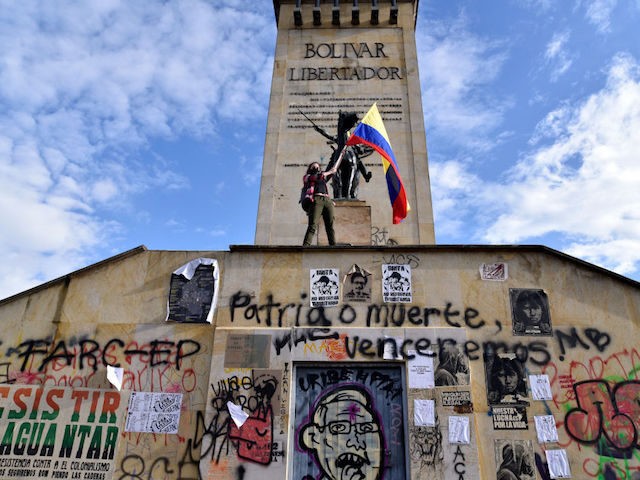Attorney General Francisco Barbosa Delgado of Colombia announced Tuesday night that government investigators had found evidence that members of communist terrorist organizations the Revolutionary Armed Forces of Colombia (FARC) and the National Liberation Army (ELN) were participating in organized violence against the police.
Colombia marked a week of riots on Wednesday that erupted nationwide after conservative President Iván Duque announced a progressive proposal to significantly raise taxes nationwide, allegedly necessary to offset government costs incurred as a result of the Chinese coronavirus pandemic. Colombia has experienced one of the most severe national outbreaks of coronavirus anywhere in the world, nearing 3 million cases since the pandemic began as of Wednesday.
The tax proposal prompted outrage on both the left and right and peaceful protests last week, which prompted Duque to table the proposal and vow to come up with a less hated way to refuel the federal government. The protests erupted into violent attacks on police and other government institutions Saturday, a Marxist holiday known as International Workers’ Day. Duque walking back the proposal has not paused rioting in major cities including Cali, Medellín, Barranquilla, Cartagena, and the capital, Bogotá.
Leftists have continued promoting a “national stoppage,” urging the blockage of major roads and highways, claiming police have responded too violently to rioters. As of Wednesday, government officials have identified over 20 people killed and nearly 1,000 injured in the nationwide outbursts of violence, which now have no specific political goal.
Barbosa updated the nation from Cali, a western city known as a beachside destination, that the Attorney General’s office has reason to believe that the FARC, ELN, and other communist terrorists have usurped what began as a movement against a progressive policy proposal. Cali endured some of the worst violence of the riots Monday night, prompting civilians to organize armed groups and target violent rioters in their communities. Cartagena, another affected city, experienced similar confrontations between law-abiding civilians and rioters Tuesday night.
“From Cali, I want to inform the country that, thanks to the investigations by a specialized team of prosecutors … we have determined that [involved in] the disorder and vandalism occurring in Cali in last days there are structures tied to drug trafficking, the ELN, and FARC dissidents,” Barbosa said. After a failed and unpopular 2016 peace deal with the FARC, for which former President Juan Manuel Santos won the Nobel Peace Prize, some of the FARC leadership accepted political power in exchange for disarmament, but much of the rank and file remained engaged in terrorism. Despite this, Colombian officials refer to the active FARC terrorists as “dissidents.”
“We are concentrating all our actions on clarifying homicides, arson, and vandalism of public and private establishments, looting, abuse against of public forces, [and] blockage of byways that have affected the right to health and have hurt the transport of vital medical materials like covid vaccines in Cali,” Barbosa said in his remarks, posted on Twitter to the official account of the Colombian Attorney General’s Office late Tuesday. Cali is home to seven open homicide investigations tied to the disturbances beginning last week, he added.
#ÚLTIMOMINUTO | Se ha logrado determinar que los desórdenes y hechos vandálicos ocurridos en Cali en los último días, tendrían una relación con estructuras del narcotráfico, el ELN y disidencias de las FARC que operan en el Cauca. pic.twitter.com/pyg9kMGnl7
— Fiscalía Colombia (@FiscaliaCol) May 5, 2021
Barbosa also levied the shocking claim that public officials were also involved in instigating acts of violence, though he did not name any politicians in particular.
Colombia’s RCN network noted that Barbosa’s confirmation of terrorist infiltration of events nominally meant to protest Duque followed similar remarks by the nation’s defense minister, Diego Molano, on Monday.
“What we already have is alleged information on the ties that exist between these FARC dissidents and groups that orchestrate and finance activities by bands of criminal vandals in these cities,” Molano said.
While Cali was the epicenter of leftist violence on Monday night, climaxing with the attempted burning down of the city’s Hotel La Luna, Bogotá suffered the most intense attacks Tuesday night. RCN reported arson attacks on 16 police stations overnight and attacks on 25 police stations in total. Six were completely destroyed. In one of these attacks, survivors in the station testified that they had reason to believe the intent of the arson attack was to burn police officers alive.
The National Stoppage Committee, a group claiming to organize nationwide strikes and road blockades, issued a statement Tuesday urging more disruptive activity Wednesday, despite the violence of the day before.
“It has been decided that we will continue to strike and social mobilization, strengthening and extending it, convening other social and regional sectors of the country and thus realizing great mobilizations this May 5,” the statement read in part, according to the Argentine news agency Infobae. The statement did not clarify the goal of these “mobilizations” or what the government needed to do to stop them from continuing.
In addition to mass attacks on police stations, the rioters have destroyed multiple statues of Colombian national heroes like Simón Bolívar and targeted banks, fire stations, and other public locations.

COMMENTS
Please let us know if you're having issues with commenting.